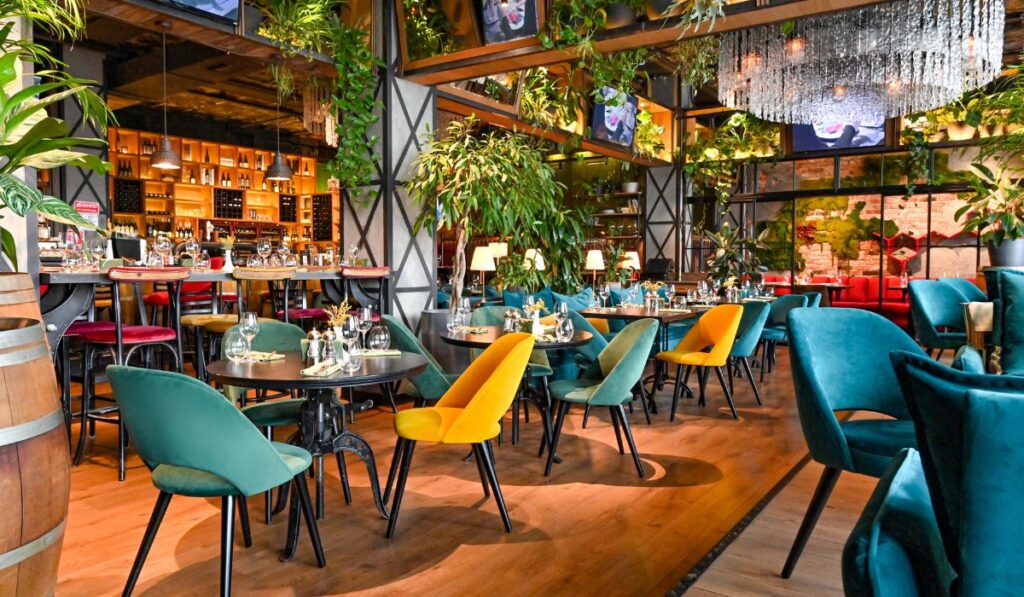Restaurant Marketing Strategies that you should use to increase footfall for your restaurant business

Introduction
Business Marketing strategies navigate companies to decide how a company will promote its products or services to target audiences. Considering the niche of eateries and restaurants, we present a multitude of strategies that can be implemented to increase footfall for your business that involve spreading the word about the business to new customers.
To establish and optimise a social media presence for the restaurant
To optimise your Google My Business listing for your restaurant
Optimizing your Google My Business listing can significantly enhance your restaurant’s online visibility and drive more reservations and orders from customers who are actively searching for dining options. A series of steps are followed to optimize Google My Business listing:
- Claim Your Listing
- Add Direct Ordering and Reservation Links,
- Include Relevant Information,
- Add High-Quality Photos & Link to Your Menu
- Use Tags and Keywords
- Encourage Reviews & Respond to Reviews
- Add Posts and Updates
- Monitor Insights.
Keyword Optimization
Research and optimise your website for relevant keywords, including both branded (restaurant name) and unbranded (related to your cuisine and location) keywords & Local SEO: Prioritise local SEO efforts by optimising your Google My Business listing. Ensuring Mobile Optimization, Maintaining Site Speed and Performance, Building high-quality backlinks from reputable websites and local directories, Implementing schema markup to provide search engines with structured data about your restaurant, including menu items, operating hours, and reviews. Using tools like Google Analytics and Google Search Console to track website’s performance and Monitoring keyword rankings, traffic, and user behavior to make data-driven improvements and Ensuring consistent NAP (Name, Address, Phone Number) information across online directories, review sites, and social media profiles.
Outreach Platforms
To effectively reach potential customers, you can leverage third-party platforms to attract new customers while also building a direct customer base and reducing the impact of fees and competition:
Utilise Third-Party Platforms
Use popular delivery and reservation marketplaces to expand your reach and attract new customers. However, be mindful of fees and competition on these platforms.
Convert to Direct Customers
Encourage third-party delivery customers to transition to ordering directly from your website or app by offering coupon codes for their first direct orders.
Dine-In Promotions
For third-party dine-in guests, provide check presenter inserts offering discounts on future meals if they sign up for your newsletter or loyalty program.
Email Marketing
Use email marketing to educate guests about the benefits of making direct reservations and orders. Highlight advantages such as exclusive promotions, better customer service, and data privacy.
Below the Line Marketing
BTL , for a Restaurant business, is aimed specifically at targeted individuals that have been identified as potential customers. You can use popular BTL strategies including outdoor advertising, such as billboards and flyers or by utilising email and social media, and sponsorship of events.
Digital Advertising
Digital advertising encompasses a wide range of online marketing strategies and channels used to promote products, services, or businesses to a digital audience. Running targeted digital ads on these platforms can help you reach a relevant audience, boost your visibility, and potentially increase customers and profits. Here are some key aspects and channels of digital advertising:
First Mover Advantage
You can take advantage of the new apps or social media tools that gain momentum, for instance, the advent of Threads can be optimally utilised to gain market value and grab eyeballs.
Social Media Ads (Facebook and Instagram)
- Target users living and working near your restaurant.
- Use demographic data to match ads with your existing customer profile.
Google Ads
- Target potential customers searching for keywords related to your restaurant.
- For instance, if you run a Burger restaurant in Delhi, bid on keywords like “best Burger Delhi,” ” Burger Delhi ,” or “Burger restaurant Delhi.”
Repeat Business
To increase your sales through repeat business, you can introduce these business strategies
Loyalty Programs
Implement a loyalty program that rewards repeat customers with discounts, free meals, or exclusive offers.
Personalized Marketing
Use customer data to personalize marketing messages and offers based on past dining preferences and behaviors.
Email Marketing
Send regular email newsletters with promotions, special events, and updates to keep your customers engaged.
Special Events
Host special events, themed nights, or seasonal promotions to attract repeat customers looking for unique dining experiences.
Feedback and Improvement
Listen to customer feedback and make improvements based on their suggestions to enhance their dining experience.
Consistency
Maintain the quality of food, service, and ambiance to ensure customers have a consistent and enjoyable experience.
Engage on Social Media
Actively engage with customers on social media platforms to build a community and keep your restaurant top of mind.
Referral Programs
Encourage customers to refer friends and family to your restaurant by offering incentives for referrals.
VIP Programs
Create a VIP program that offers special perks and privileges to your most loyal customers.
Online Reservation System
Implement an easy-to-use online reservation system to streamline the booking process and improve customer satisfaction. By focusing on building strong relationships with existing customers and offering them value and incentives to return, you can significantly increase customers and sales through repeat business.
Cross Promotion Strategies
Restaurants can encourage by effectively cross-promoting various services to customers, such strategies can be:
Marketing Automation Software
Utilise marketing automation software to send targeted offers, such as “we miss you” messages, via email or SMS to customers who have dined with you in the past. Personalized communication can re-engage past guests.
Cross-Promotion
Cross-sell your services to different customer segments. For example, encourage dine-in guests to order delivery or takeout, and promote reservations to your delivery customers.
Promo Codes
Offer promo codes to incentivize guests to try a different service, such as ordering online for the first time. Automate email campaigns to distribute these codes efficiently.
Upgrades and Special Offers
Motivate pickup and delivery customers to visit your restaurant in person by offering enticing upgrades, like a free champagne toast upon arrival. Use email marketing to communicate these offers effectively.
Conclusion
In conclusion, a well-rounded Business Marketing strategy for restaurants requires ongoing attention, adaptability, and a commitment to delivering excellent customer experiences. By consistently reviewing and optimizing your marketing strategy, restaurants can position themselves for continued success in a competitive market.

